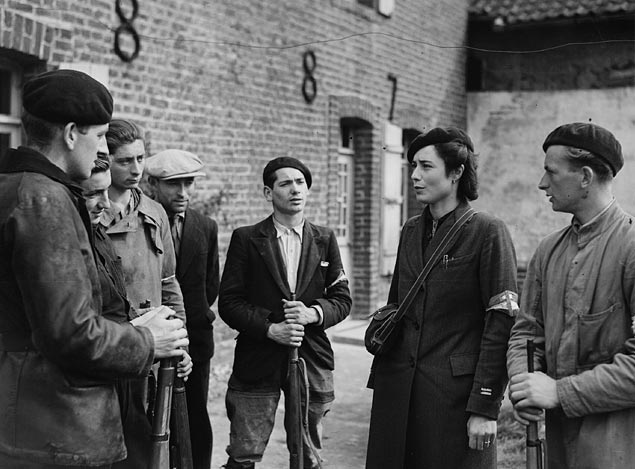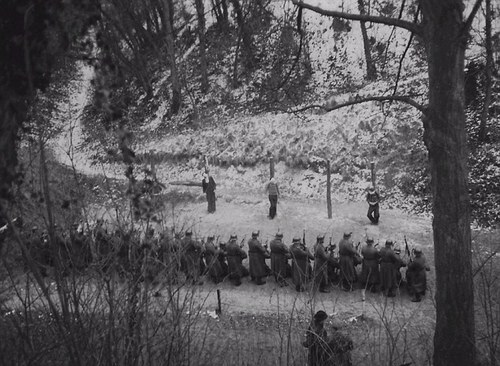I wrote this some time ago and never posted it, I'm not entirely sure why. The campaign that it refers to can be found here. In fact, I've just added a page with the battle reports, which you'll find above.
The flag of the Free Republic of Vercours
The girls and boys came over to play last week, which was good fun. Mrs Kinch and her cronies retired to the parlour bearing crotchet and bottles of wine, while we fought over the Vercours Campaign. Memoir '44 unlike many wargames in the English speaking world has a very strong connection to France, mainly as it was part comissioned by the Historical Section of the French Army as part of the commemoration of the 60th anniversary of the D-Day landings.
A meeting of Maquis
We played the Vercours Campaign because it was the game that I could do in 1/72. I have an extensive Second World War collection in 6mm, but it doesn't have the same feel. There is something to be said for 6mm, it's a fine scale and played on a six foot by four foot board it would certainly give a closer figure scale to ground scale look, but I like playing with bigger toy soldiers, so 1/72 is the thing.
Maquis being executed by the German army
I enjoy wargaming. I like playing with toy soldiers - it's a wonderful hobby and I have made many firm and lasting friendships through it. It does make one pause for thought on occasion - when you consider the reality that the game represents. There is a moment in the series, "The World at War" powerfully narrated by Sir Laurence Olivier, where he describes some footage of German prisoners of war struggling to gather potatoes thrown from a truck. I can't find the footage or the quotation online, but he muses how long it will be before children forget that is a real man and a real potato.
I don't think there are any great moral struggles to be had in wargaming, there are things that are not done of course, but that applied to all aspects of life. There is too much evil in the world to worry about what games men play in safety and comfort. There is a point to it I suppose, as a thought experiment - but I'd it's about as morally dangerous as a performance of Titus Andronicus.
I rather like David Mitchell's take on the whole thing.
Rape & Pillage
The Maquis are interesting though, often ill organised, always poorly armed, they possessed a courage that was beyond description. Though I disagree with him, often violently, I have always respected Albert Camus's great novel of resistance, "The Plague." It's a curious book, written about men working to defeat an outbreak of bubonic plague in an Algerian city, though it is often cast as an allegory of the French resistance.
Curiously for a book by an avowed atheist, I find myself thinking of it when I'm having difficulty living a Christian life. It recognises that all lives end in defeat. That struggle is necessary and worthwhile despite the fact that it is boring and ultimately futile. I reread the passages regarding the death of Father Paneloux on occasion, but I've always had a soft spot for this passage.
"What's true of all the evils in the world is true of the plague as well. It helps men to rise above themselves. All the same, when you see the misery it brings, you'd need to be a madman, or a coward, or stone blind, to give in tamely to the plague."
"Paneloux is a man of learning, a scholar. He hasn't come in contact with death; that's why he can speak with such assurance of the truth-with a capital T. But every country priest who visits his parishioners and has heard a man gasping for breath on his deathbed thinks as I do. He'd try to relieve human suffering before trying to point out its goodness."
"Tarrou nodded. 'Yes. But your victories will never be lasting; that's all.' Rieux's face darkened. 'Yes, I know that. But it's no reason for giving up the struggle.'"
"I've seen enough people who die for an idea. I don't believe in heroism; I know it's easy and I've learnt it can be murderous. What interests me is living and dying for what one loves."
"There's no question of heroism in all this. It's a matter of common decency. That's an idea which may make some people smile, but the only means of fighting a plague is – common decency."
I suppose that is what I think of when I think of the French Resistance. They were vicious enough in their turn - but I suppose it is easy to say that in warmth and comfort with a full belly.
The fact remains they were a victory for decency.














.png)






























Conrad, that's a very fine post indeed. "Courage beyond description" really sums up the Maquis (and other resistance movements). There are enough revisionist accounts published about the Maquis to realise that they were complex, contradictory and motivated by a wide variety of aims. But with De Gaulle and the Free French they resurrected the spirit and pride of a great nation at great cost. No better tribute than to have these brave men and women represented on our wargames tables.
ReplyDeleteI think that phrase, a victory for decency, sums a lot of fairly ugly things rather well.
ReplyDeleteFMB
I'd not seen the David Mitchell sketch before- well reasoned and still funny I approve. Thank you for bringing it to my attention. The rest of your post was up to the same high standard. Peoples personal ethics when it come to wargaming are always of interest to me... one day I'll formulate my own into a blog post.
ReplyDeleteCheers,
Pete.
Hrm. This does go a long way towards explaining why I always enjoy a wargame more when the option of snazzy period headgear is available.
ReplyDelete